Sector players have warned that Africa risks falling further behind in global education unless urgent action is taken to address chronic underfunding and learning poverty, despite governments dedicating significant portions of their budgets to the sector.
Speaking at the Education Financing Symposium in Kampala, Tineyi Mawocha, Chief Program Officer and Africa Regional Director of Opportunity International, said the continent now accounts for the highest number of out-of-school children globally, with 61 million excluded from classrooms. Globally, 263 million children remain out of school.
Mawocha noted that even among those enrolled, millions are not acquiring basic literacy and numeracy. “About 70 percent of children in low- and middle-income countries completing primary school cannot read well enough to understand a simple story,” he said, citing World Bank data.
Despite African governments committing up to 20 percent of national budgets to education, low tax revenues and limited fiscal space have left funding gaps.
The global education finance market is estimated at $36.4 billion, with Africa accounting for just $5.4 billion, a figure expected to grow in the next five years.
Opportunity International has invested over $1 billion into education through 208 financial institutions in 32 countries, reaching 19 million children.
In Uganda, products such as school improvement loans and fee loans have enabled schools to expand and parents to keep children in class, with 85 percent of parents who accessed loans returning their children to school.
Mawocha cited platforms such as Furaha, developed with Standard Chartered Ventures, telecom companies, and financial institutions, which links to 25 million mobile wallets and supports fee payments for up to 6 million children across 14,000 schools in Uganda.
He stressed that building resilient education systems requires blended financing, inclusive models for girls and marginalised groups, technology to support teachers, and training for school leaders.
“Africa stands at a crossroads with the youngest and fastest-growing population. Our choices today will shape the continent’s future. Let us choose to invest in resilient, inclusive, and sustainable education systems that leave no child behind,” Mawocha urged.
Fincom Technologies Chief Executive Officer Charity Mutagamba said the Covid -19 pandemic exposed the fragility of education financing, with many schools unable to sustain operations and thousands of learners dropping out.
“We must enable the education ecosystem to be sustainable. Schools need timely financing to run effectively and focus on quality learning, while parents must pay fees consistently to support operations,” Mutagamba said.
She added that beyond fees collection, technology can play a wider role in strengthening transparency and accountability in the sector.
“The innovations we have developed can support government in monitoring school financing, including capitation grants, while improving accountability at all levels. We are open to working with policymakers and other partners to ensure that education financing is transparent and better monitored,” Mutagamba said.
The symposium, held under the theme “Building a Resilient Education Value Chain”, brought together education officials, financial institutions, and civil society to discuss sustainable financing models for schools.
Mutagamba stressed that collaboration among stakeholders was essential to achieving lasting solutions.
“There is still a lot we can do, but we cannot do it alone. We must work together with government, financiers, and educators to come up with better solutions for our nation,” she said.


